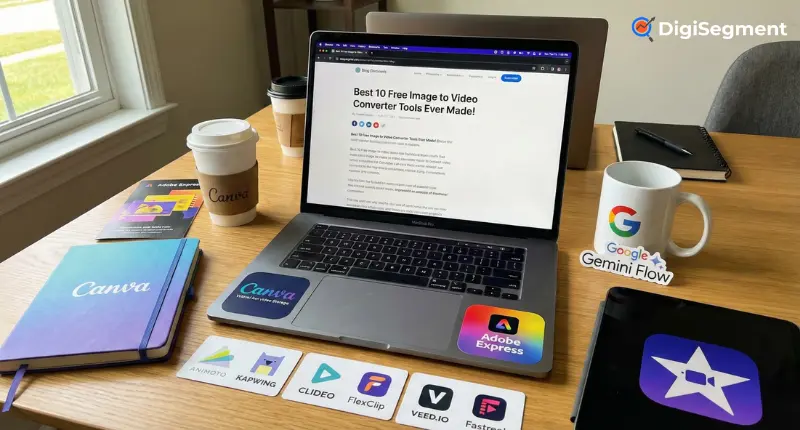Do you notice how people increasingly ask questions to Siri, Alexa, or Google Assistant instead of typing? This shift happens because voice search SEO is changing how we search for information online.
If you want your business to stay competitive, you must optimize for voice search SEO, because it impacts visibility and engagement.
So, in this blog, we’ll explore what voice search SEO is, why it’s necessary, and how to optimize for it, so your brand remains top of mind in 2025 and beyond.
Why Voice Search SEO Matters Today
With the rise of smart speakers and voice assistants, search has changed dramatically, because users no longer enter short keywords.
They speak naturally, asking long, conversational queries, such as: “What is the best digital marketing agency near me?”
So, when you optimize for Voice search, your content appears to users searching with these types of questions.
Benefits of Voice Search SEO
- Gain more visibility in Voice search optimization results, because appearing in spoken queries boosts discoverability.
- Achieve higher engagement, because users receive instant answers and interact with your brand quickly.
- Improve your brand’s voice search presence, so customers can find you naturally when asking questions aloud.
But businesses that ignore Voice search optimization risk losing customers who prefer speaking to typing queries.
1: Know What People Ask
Voice search queries are conversational and question-oriented, because people naturally speak when using smart devices.
Face it — you’d never ask your phone “SEO tips” directly, but instead ask: “How do I optimize my website for voice search SEO?”
To get voice search SEO right, you must understand the questions your audience is asking, so you can answer effectively.
Use tools like AnswerThePublic, Google’s People Also Ask, and HV Digital Marketing’s keyword research tools, because they reveal real user queries. This approach allows you to create content that naturally answers those questions and improves voice search SEO visibility.
2: Make Content Featured Snippet Ready
Voice assistants are likely to take answers from featured snippets — those small boxes at the top of Google search results.
How to Make Content Snippet-Ready
- Respond to queries in simple one- or two-sentence answers, because concise responses improve voice search SEO
- Use headers like H2 or H3 for each question, so content remains organized and easy to read.
- Keep sentences short and conversational, because this helps both users and voice assistants understand your content.
If you need expert help, HV Digital Marketing can assist, because they specialize in creating content that ranks in voice search SEO and featured snippets.
3: Use Conversational Keywords
People speak differently than they write, and this is why voice search SEO must focus on natural phrases.
- Don’t just use “SEO tips,” but instead ask: “What are some of the best SEO tips for small business?”
- Employ long-tail keywords and conversational query phrases in your copy, because these match how users speak.
This is a crucial voice search SEO strategy, because Google favors content that answers questions naturally and conversationally.
4: Optimize Page Loading Speed and Mobile Experience
Voice searchers want quick answers. A slow website can destroy your voice search ranking.
Tips for Speed and Mobile
- Ensure your website loads within 3 seconds, because fast-loading pages improve user experience and voice search optimization.
- Use a responsive design so your site is mobile-optimized, and users can access it easily on any device.
- Optimize images and scripts to load quickly, because speed directly impacts search rankings and voice search optimization.
Digi Segment offers detailed tutorials on website speed optimization for SEO, so optimizing these parameters boosts your voice search optimization results.
5: Create FAQ Sections
FAQs are gold nuggets as far as voice search SEO is concerned. They mimic natural spoken search queries.
FAQ Section Tips
- Respond to every question in one or two sentences, because concise answers improve user experience and readability.
- Use keywords like “how to optimize content for voice search” and “essential voice SEO hacks,” because they match natural queries.
- Insert structured data, such as FAQ schema, so Google can pull answers for voice results and enhance site authority.
FAQs make your site more discoverable by voice assistants, and they support better voice search optimization naturally.
6: Optimize for Local SEO
Local searches constitute most of voice searches. Think about individuals asking:
“Where is the café nearby?”
Local SEO Tips
- Ensure your business appears accurately in Google My Business, because visibility drives local traffic and customer engagement.
- Optimize your content with local keywords, and include relevant phrases to attract nearby customers searching online.
- Maintain consistency in your name, address, and phone number across directories, because inconsistency can confuse Google and users.
Businesses that combine voice search optimization and local SEO often see increased foot traffic, calls, and overall engagement.
7: Take Advantage of Structured Data
Structured data tells Google exactly what your content is about, because clarity improves voice search optimization.
It highlights answers for quick retrieval, and improves your chances of appearing in rich results.
Structured data also boosts visibility for SEO for voice, because search engines can better understand your content.
Schema markup is technical, but it can dramatically enhance your voice search optimization and ranking potential.
8: Optimize Content for Being Conversational and Natural
Write content as if you’re talking to a friend, because voice search optimization works best with natural phrasing.
- Use short sentences, and keep ideas clear, because concise content improves readability for both users and voice assistants.
- Include natural transitions like “and,” “but,” “so,” and “because,” because they make your content flow conversationally.
- Break up content with headings and bullet points, so information is easy to scan and understand.
The more natural your content is, the better it ranks in voice search optimization, and users engage more effectively.
9: Optimize for Mobile
Voice searches occur mostly on mobile. A bad mobile experience negatively affects rankings.
Mobile Optimization Tips
- Implement responsive design, because mobile-friendly sites improve user experience and support voice search optimization.
- Don’t use pop-ups that cover content, and keep your interface clean, because intrusive elements frustrate users.
- Make buttons and links simple to tap, so mobile visitors navigate easily and engage with your website.
Digi Segment provides mobile optimization tips for SEO, because these directly enhance your voice search optimization performance.
10: Track and Optimize Voice Search Performance
Track your voice-optimized content’s performance, because monitoring helps improve voice search optimization results over time.
- Use Google Search Console to see which queries are driving traffic, and identify growth opportunities.
- Check analytics reports for voice-related keywords, so you can optimize content for better user engagement and results.
- Optimize to answer questions faster and more accurately, because timely answers improve your voice search optimization
Monitoring these metrics ensures your strategy adjusts to trends, and keeps your content competitive in voice search.
Mistakes to Avoid
Mistakes happen even with pros, and you should steer clear of these common voice search optimization pitfalls.
- Avoid keyword stuffing unnaturally, because it can harm rankings and frustrate users.
- Don’t ignore conversational queries, and make sure your content answers natural questions accurately.
- Use structured data, because schema helps Google understand your content and improves voice search optimization.
- Ensure fast site and mobile speed, so users have a smooth experience and search engines rank you better.
- Take local SEO for voice searches into account, because combining both boosts visibility for nearby customers.
Avoiding these shortcuts maintains your voice search optimization rankings strong and your content competitive.
Conclusion
Voice search isn’t the future anymore — it’s present. Voice search SEO strategies keep your business up to date, accessible, and competitive.
When you want expert help to optimize for voice search and gain visibility in voice search results, look at Digi Segment for step-by-step guides, or contact HV Digital Marketing, an expert team in creating high-performance voice SEO content.
Because when it comes to search today, being heard is every bit as important as being found.
FAQs
Voice search SEO is optimizing your website to appear in searches made via voice assistants like Google or Siri.
It helps your business get discovered through natural, conversational voice queries and boosts engagement.
Use short, conversational answers, FAQs, natural keywords, and structured data to improve visibility.
Voice search optimization is making your website and content discoverable for spoken queries.
Focus on local SEO, featured snippets, mobile-friendly pages, fast loading, and conversational content.
Include long-tail question phrases, optimize FAQs, use structured data, and answer queries naturally.
Keep your NAP consistent, claim your Google Business Profile, and include local keywords in your content.
Voice SEO targets natural, conversational queries, while text SEO often targets shorter keywords and phrases.
Track analytics for question-based queries, monitor featured snippet appearances, and use Google Search Console data.
Yes! Agencies like HV Digital Marketing can implement strategies to improve your voice search presence.
I’m Hardik Vaghani, founder of HV Digital Marketing, a results-driven digital marketing agency. I specialise in SEO, Google Ads, and social media marketing, helping businesses grow their online presence with proven strategies. I’m passionate about creating high-quality, SEO-optimised blogs that educate readers and rank on Google. My goal is to turn ideas into measurable digital success through smart, ethical marketing.













